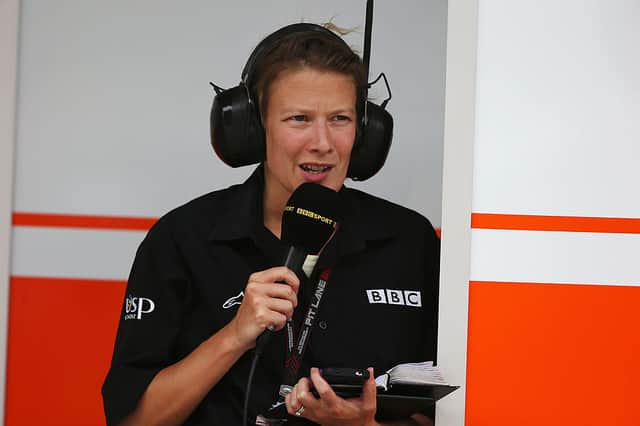Jennie Gow stroke: what BBC F1 presenter said on Twitter - who is husband Jamie Coley?


BBC F1 presenter and Extreme E commentator Jennie Gow has revealed on social media that she has suffered from a “serious” stroke. Fans of the Netflix hit series Drive to Survive will know Gow from her appearances throughout the third season.
The 45 year old told her followers on Twitter and Instagram that she was “desperate to make a full recovery”, with the aim of hopefully returning to work, but that it might “take some time”.
What did she say on Twitter?
Advertisement
Hide AdAdvertisement
Hide AdGow took to social media to reveal that the reason she had been quite online recently was because she had suffered from a “serious stroke”.
Her post read: “Hi everyone, been quiet the last few weeks, this is because I suffered a serious stroke two weeks ago. My husband is helping me type this, as I’m finding it hard to write and my speech is most affected.
“I’m desperate to make a full recovery and return to work, but it might take some time. Thank you to the medical teams at Frimley and St George’s and my family and friends who’ve got me through the last fortnight x”


Gow has received an outpouring of support in response to the news, with fellow sports broadcaster Laura Winter writing on Twitter: “Jennie, so desperately sorry to read this and sending all my love and strength. You WILL get through this but take all the time you need. We’ll all be here. So much love. Xxx”
Advertisement
Hide AdAdvertisement
Hide AdThe official McLaren account also replied: “Wishing you a speedy recovery, Jennie. The entire team sends their love and strength as we look forward to seeing you back in the paddock.”
“So sorry to read this Jennie. Shout me if you need anything. We have experience of Stroke in our house. Take your time in recovery. Sending big [heart emoji],” broadcaster Phil Williams wrote.
Who is her husband?
Jennie Gow is married to Jamie Coley, with the two having celebrated their 10 year anniversary on 12 February 2022.
Coley is also involved in the world of F1, working as a Sky Sports F1 video producer. According to his Twitter profile, he was a Sky F1 Report Show creator and producer from 2014 to 2018.
What is a stroke?
Advertisement
Hide AdAdvertisement
Hide AdThe NHS defines a stroke as a “serious life-threatening medical condition that happens when the blood supply to part of the brain is cut off”.
The symptoms of a stroke can be identified by remembering the word FAST:
- Face: the face may have dropped on one side, the person may not be able to smile, or their mouth or eye may have dropped
- Arms: the person with suspected stroke may not be able to lift both arms and keep them there because of weakness or numbness in one arm
- Speech: their speech may be slurred or garbled, or the person may not be able to talk at all despite appearing to be awake; they may also have problems understanding what you’re saying to them
- Time: it’s time to dial 999 immediately if you see any of these signs or symptoms
Treatment for a stroke depends on which part of the brain was affected, what caused it, and the type of stroke a person has had - there are two kinds:
- Ischaemic, which is where the blood supply is stopped because of a blood clot, accounting for 85% of all cases
- Haemorrhagic, which is where a weakened blood vessel supplying the brain bursts
Generally, strokes are treated with medicine, although in some cases procedures may be required in order to remove any blood clots. Surgery may also be needed to treat brain swelling and reduce the risk of further bleeding if this was the cause of the stroke.
Comment Guidelines
National World encourages reader discussion on our stories. User feedback, insights and back-and-forth exchanges add a rich layer of context to reporting. Please review our Community Guidelines before commenting.
